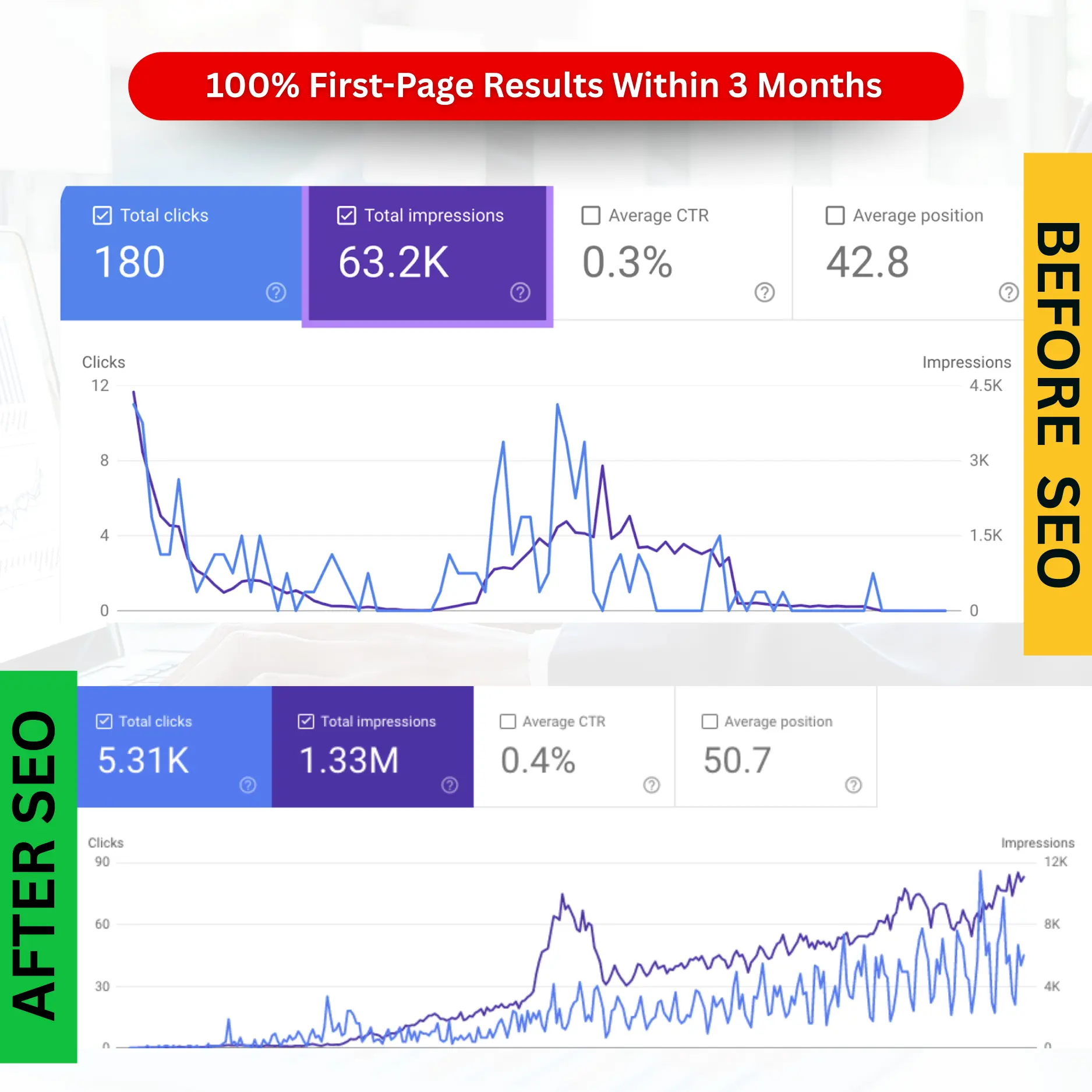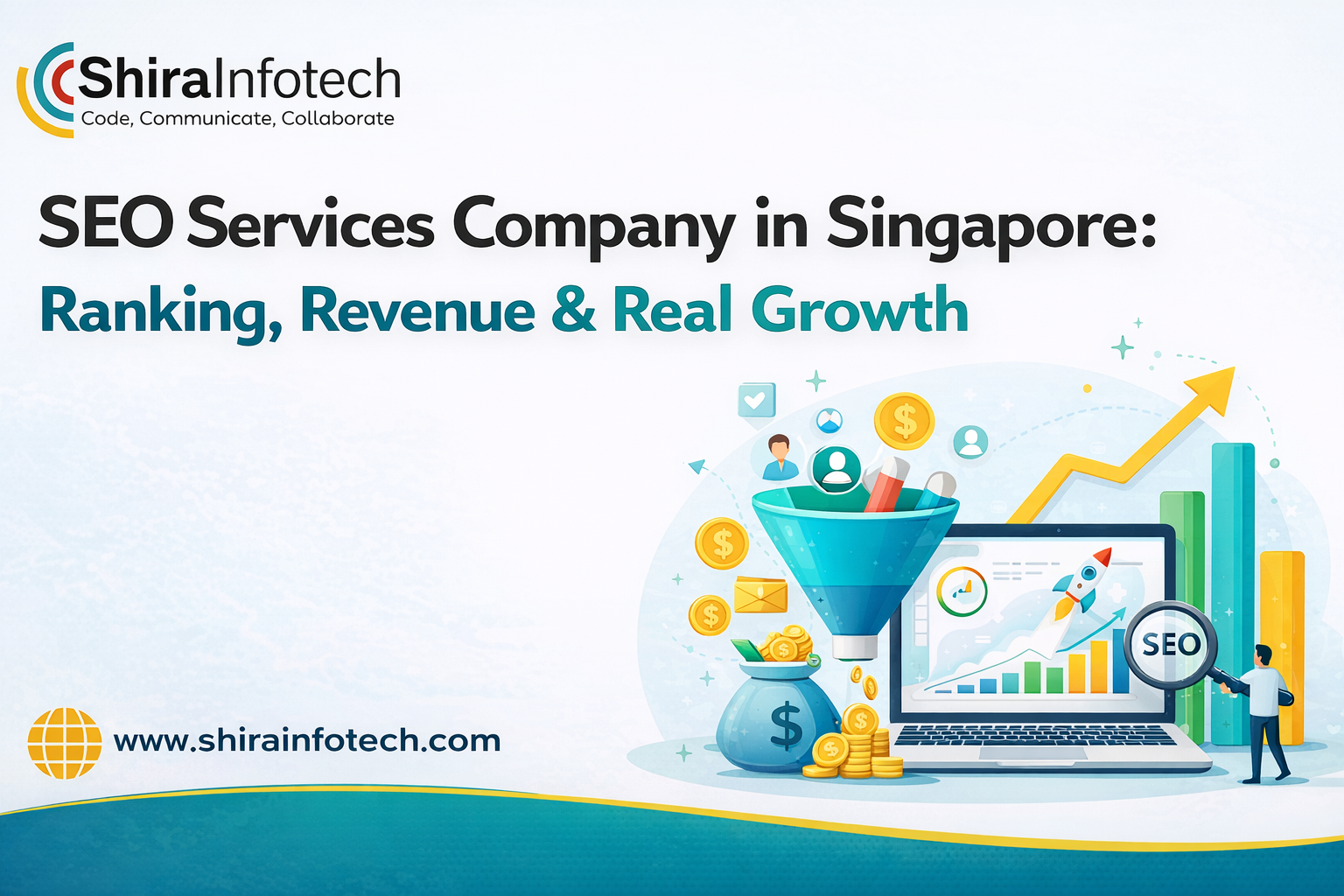Best Digital Marketing Agency & Company in India Your Trusted Digital Partner for Business Growth
At Shira Infotech, we have been dedicated to delivering top-notch IT services since our inception in 2014. Our journey has been characterized by a relentless commitment to excellence and a passion for technology. As a leading IT service provider, we take pride in our mission to empower businesses and individuals with cutting-edge solutions that drive success in the digital age.
More About Us10+
Years of Experience

1200+
Projects Delivered

1000+
Happy Customers

100+
Team Strength

25+
Countries We Serve

10+
Technology Partners

Our Capabilities
Best Digital Marketing Service in Noida for Your Business
Shira Infotech provides the best digital marketing services in Noida, helping businesses grow with expert SEO, PPC, and social media strategies. Our result-driven solutions improve visibility, generate leads, and boost ROI. Partner with us to enhance your brand presence and achieve long-term online success in today’s competitive market.
Best SEO Company in Noida/Delhi NCR
Get your website highly visible in search results and attract potential customers with Shira Infotech. SEO is the proven technique that analyzes search engine algorithms, updates, and user behavior to rank your website on top search engines like Google, Yahoo, and Bing. It involves organic positioning, meta tags, keyword density analysis, and strategic keyword placement. Our SEO experts understand search engine instincts and user experience to craft a winning strategy based on in-depth research, website content, and competitor analysis.
Shira Infotech is the Best Digital Marketing Agency In Noida (Delhi NCR) , providing a 100% guarantee of first-page results within 3 months. We offer customized SEO services at competitive prices, designed to meet the needs of startups as well as established enterprises. With tailored SEO packages, we ensure higher rankings, more traffic, and sustainable online success for every business.
Book a Free SEO Audit
DISCUSSION
We begin with a consultation to understand your business goals, target audience, and industry needs.
STRATEGY
Our experts design a tailored digital marketing strategy combining SEO, paid ads, social media, and content marketing.
EXECUTION
We implement the strategy with precision, ensuring campaigns run smoothly and consistently across all digital platforms.
RESULTS
Our team delivers clear reports, monitors progress, and refines campaigns to maximize ROI and long-term business growth.
Our Recent Work
Our work reflects expertise, innovation, and trust. At Shira Infotech, we deliver measurable results that build long-term client confidence. Explore our projects to see how we turn ideas into impactful outcomes.
Technology Solutions We Offer
Empowering Your Future with Innovative Technology Solutions

Angular

CSS3

HTML5

Javascript

ReactJs

Codeigniter

Laravel

NodsJs

PHP

Drupal

Wordpress

Magento

Shopify

Woocommerce

Firebase

MongoDB

MySQL

SQL Server

Oracle

Azure

Google Cloud

AWS

Salesforce

Zoho
Latest blog
Learn some new info from
our latest news
Local “Near Me” Searches That Grow Your Business Fast | Shira Infotech.
In today’s digital-first world, customers no longer search the way they used to. Instead of typing long brand names or browsing endlessly, people now ask Google simple, intent-driven questions like “services near me,” “best company near me,” or “top agency in my area.” These local “near me” searches have quietly become the fastest and most powerful growth engine for businesses - especially local service providers, clinics, consultants, and B2B companies. If your business is not visible when customers search near you, you are losing ready-to-buy customers every single day. This is where the right local SEO strategy and the right partner like Shira Infotech makes all the difference. What Are “Near Me” Searches and Why Do They Matter So Much? “Near me” searches are location-based searches where users want immediate, nearby solutions. Examples: SEO company near me Best service provider near me Digital marketing agency near me Clinic near me open now These searches signal high intent. The user is not researching. They are ready to: Call Visit Book Buy Google understands this urgency and prioritizes local businesses that are optimized correctly. That’s why ranking for local “near me” searches can grow your business faster than traditional SEO alone. Why Local “Near Me” Searches Convert Faster Than Any Other Traffic Let’s be clear - not all traffic is equal. ???? Local Search Traffic = Ready Customers People searching “near me” already: Trust Google Want quick results Prefer local businesses Are close to making a decision This makes local SEO traffic highly converting compared to social media or generic blog traffic. ???? Visibility at the Right Moment When someone searches “best SEO agency near me” and finds your business: You appear at the exact moment of need You face less competition You gain instant credibility That’s why businesses working with a professional SEO services Noida provider see faster ROI. How Google Decides Which Business Ranks for “Near Me” Searches Google does not randomly rank businesses. It looks at three key factors: 1️⃣ Relevance How well your website, content, and business profile match the search query. 2️⃣ Distance How close your business is to the searcher’s location. 3️⃣ Authority & Trust Your reviews, website quality, backlinks, content authority, and local citations. A top SEO company in Noida understands how to balance all three. Why Most Businesses Fail to Rank for Local Searches Many businesses assume: Having a website is enough Running ads replaces SEO Google My Business alone will rank them Unfortunately, this leads to: Low visibility Missed leads Wasted marketing budgets Without a structured local SEO strategy from experienced SEO experts in Noida, your business remains invisible to “near me” searches. How Local SEO Directly Translates into Business Growth Local SEO is not about rankings alone. It’s about business outcomes. When done right, it delivers: More phone calls More walk-in customers More form submissions Higher brand trust Lower customer acquisition cost This is why businesses partner with a best SEO agency in Noida rather than relying on shortcuts. The Role of a Strong Local SEO Partner Not all agencies understand local search deeply. A reliable SEO company in Noida focuses on: Search intent Local relevance Conversion optimization Long-term visibility At Shira Infotech, local SEO is approached as a business growth system, not a checklist. ???? Learn more about their local expertise here: ???? https://www.shirainfotech.com/ How Shira Infotech Helps Businesses Win “Near Me” Searches ✔ Location-Focused SEO Strategy Every page is optimized around: City names Service areas Local intent keywords Google Maps signals ✔ Google Business Profile Optimization Complete optimization including: Categories Service areas Weekly posts Reviews strategy Trust signals ✔ Content That Ranks and Converts Content is written for humans first and search engines second - ensuring visibility and engagement. ✔ Technical SEO for Local Performance From page speed to mobile usability, everything is optimized for local users. This approach has helped position Shira Infotech as a top SEO company in Noida for businesses serious about growth. Why Businesses Prefer a Local SEO Agency Over National Firms Local agencies understand: City-specific competition Regional customer behavior Local language and tone Search trends unique to your area That’s why businesses searching for the best SEO agency in Noida prefer working with experts who know the local market. Explore their Noida-focused SEO services here: ???? https://www.shirainfotech.com/location/best-seo-company-in-noida Industries That Benefit the Most from “Near Me” Searches Local SEO works exceptionally well for: IT & Software companies Clinics & healthcare providers Educational institutes Consultants & agencies Service-based businesses B2B companies targeting local clients If customers can physically or locally engage with your business, near me searches are your growth shortcut. Local SEO vs Paid Ads: Which Grows Business Faster? Paid ads: Stop when the budget stops Cost more over time Deliver short-term visibility Local SEO: Builds long-term visibility Reduces cost per lead Delivers compounding returns That’s why businesses investing in professional SEO services Noida see sustainable growth. Common Myths About Local SEO ❌ “SEO takes years” ✅ Local SEO can generate leads in weeks ❌ “Only big brands rank” ✅ Local relevance beats brand size ❌ “Reviews don’t matter” ✅ Reviews heavily influence local rankings Why “Near Me” Searches Will Matter Even More in the Future With: Voice search growth Mobile-first indexing AI-powered search results Local intent will dominate search behavior. Businesses that invest now with the right SEO experts in Noida will own their local markets tomorrow. Final Thoughts: Local Visibility Is Business Power If your business wants: Faster growth More qualified leads Better ROI Stronger brand trust Then ranking for local “near me” searches is no longer optional. Partnering with a best SEO agency in Noida like Shira Infotech ensures your business shows up exactly when customers are searching for you. ???? Start building your local dominance today: ???? https://www.shirainfotech.com/
Digital Marketing Companies in Singapore: Complete Guide for Businesses 2026.
Singapore has emerged as one of Asia’s strongest digital economies. With a tech‑savvy population, high internet penetration, and a business‑friendly ecosystem, the demand for professional digital marketing companies in Singapore has grown rapidly. From startups and SMEs to multinational corporations, businesses across industries rely on digital marketing agencies to build visibility, generate leads, and drive sustainable growth. This in‑depth guide explores digital marketing companies in Singapore, the services they offer, why they matter, how to choose the right agency, industry‑specific use cases, emerging trends, and what the future holds. The content is written in an easy‑to‑read, highly connective style so business owners, marketers, and decision‑makers can clearly understand how digital marketing works in the Singapore market. 1. Why Digital Marketing Is Crucial in Singapore Singapore is one of the most digitally connected countries in the world. With over 90% internet penetration and one of the highest smartphone adoption rates globally, consumers spend a significant amount of time online. They search on Google, scroll social media, watch videos, read reviews, and compare brands before making decisions. Traditional marketing channels such as print and outdoor advertising still exist, but digital marketing delivers measurable, scalable, and cost‑effective results. Businesses can target specific demographics, track performance in real time, and optimize campaigns continuously. Key reasons digital marketing is essential in Singapore: Highly competitive business environment Digitally aware consumers with high expectations Strong reliance on search engines and social media Growing e‑commerce and online service bookings Data‑driven decision‑making culture Digital marketing companies in Singapore help businesses navigate this competitive landscape with structured strategies and proven tools. 2. What Do Digital Marketing Companies in Singapore Do? A digital marketing company is a professional agency that helps businesses promote their products or services online. These agencies combine strategy, creativity, technology, and data to achieve marketing goals. In Singapore, digital marketing agencies typically provide end‑to‑end solutions, including planning, execution, optimization, and reporting. Their role includes: Understanding business objectives and target audiences Creating customized digital strategies Executing campaigns across multiple platforms Measuring performance using analytics tools Improving ROI through continuous optimization Rather than offering one‑size‑fits‑all solutions, top agencies in Singapore focus on tailored strategies aligned with market behavior and industry demands. 3. Core Services Offered by Digital Marketing Companies in Singapore 3.1 Search Engine Optimization (SEO) SEO is one of the most in‑demand services in Singapore. It focuses on improving a website’s visibility on search engines like Google. SEO services include: Keyword research for Singapore and regional markets On‑page optimization (content, meta tags, structure) Technical SEO (site speed, mobile optimization, indexing) Local SEO for Google Business Profile Link building and authority development SEO audits and competitor analysis With high competition across industries, SEO helps businesses attract organic traffic that converts over the long term. 3.2 Pay‑Per‑Click Advertising (PPC) PPC advertising allows businesses to appear at the top of search results or on social platforms through paid campaigns. Common PPC services include: Google Ads (Search, Display, Shopping) YouTube Ads Bing Ads Remarketing campaigns Conversion tracking and ROI analysis Singapore businesses often use PPC for immediate visibility, lead generation, and time‑sensitive promotions. 3.3 Social Media Marketing (SMM) Social media is deeply integrated into daily life in Singapore. Platforms like Facebook, Instagram, LinkedIn, TikTok, and YouTube play a major role in brand discovery. Social media services include: Social media strategy and planning Content creation (posts, reels, videos) Paid social advertising Community management Influencer marketing campaigns Performance tracking and reporting Digital marketing companies in Singapore help brands maintain consistent engagement and build trust with their audience. 3.4 Content Marketing Content is the backbone of digital marketing. High‑quality content builds authority, improves SEO, and nurtures customer relationships. Content marketing services include: Blog writing and optimization Website content creation Case studies and whitepapers Video and visual content Email newsletters Content calendars and strategy Singapore agencies focus on clear, informative, and value‑driven content that resonates with local and international audiences. 3.5 Email Marketing Despite the rise of social media, email marketing remains one of the highest ROI channels. Email marketing services include: Campaign strategy and automation Email copywriting and design Audience segmentation Drip campaigns and lead nurturing Analytics and optimization Digital marketing companies in Singapore use email marketing to maintain long‑term relationships with customers. 3.6 Web Design and Development A strong digital presence begins with a well‑designed website. Many digital marketing companies in Singapore also offer web development services. These include: Responsive website design UX/UI optimization E‑commerce development Landing page design Website maintenance and security A conversion‑focused website supports all digital marketing efforts. 3.7 Conversion Rate Optimization (CRO) CRO focuses on improving the percentage of visitors who take desired actions on a website. CRO services include: User behavior analysis A/B testing Funnel optimization Call‑to‑action improvements Heatmap and session recording analysis This service is especially valuable in competitive Singapore markets where traffic costs are high. 4. Industries Served by Digital Marketing Companies in Singapore Digital marketing agencies in Singapore work with a wide range of industries. 4.1 E‑commerce With strong logistics infrastructure and high consumer trust, e‑commerce is booming in Singapore. Agencies help online stores with SEO, ads, product optimization, and retention strategies. 4.2 Finance and FinTech Banks, fintech startups, and insurance companies rely on digital marketing for lead generation, brand trust, and compliance‑friendly messaging. 4.3 Healthcare and Wellness Healthcare providers use digital marketing to educate patients, improve visibility, and manage reputation. 4.4 Real Estate Property developers and agents leverage SEO, paid ads, and virtual tours to attract buyers and investors. 4.5 Education and EdTech Schools, training institutes, and online learning platforms use digital marketing to increase enrollments. 4.6 B2B and Professional Services Consultants, IT firms, and service providers use LinkedIn marketing, SEO, and content marketing for lead generation. 5. How to Choose the Right Digital Marketing Company in Singapore Choosing the right agency is critical for success. 5.1 Define Your Goals Clearly outline your objectives, such as brand awareness, lead generation, sales growth, or market expansion. 5.2 Check Industry Experience Look for agencies with experience in your industry or similar markets. 5.3 Evaluate Case Studies and Results Reputable digital marketing companies in Singapore share proven results and success stories. 5.4 Understand Their Strategy Avoid agencies that promise instant results. Sustainable growth comes from structured strategies. 5.5 Transparency and Communication Choose agencies that provide clear reporting, regular updates, and open communication. 6. Benefits of Hiring a Digital Marketing Company in Singapore Access to skilled professionals Data‑driven strategies Cost‑effective marketing solutions Scalability and flexibility Focus on core business operations Up‑to‑date with latest trends and tools Singapore agencies combine global expertise with local market understanding. 7. Digital Marketing Trends in Singapore (2026 and Beyond) 7.1 AI‑Driven Marketing Artificial intelligence is transforming campaign optimization, personalization, and analytics. 7.2 Voice and Visual Search Optimizing for voice assistants and image‑based searches is becoming increasingly important. 7.3 Short‑Form Video Content Platforms like TikTok and Instagram Reels dominate user engagement. 7.4 Data Privacy and Compliance Agencies must comply with PDPA and global privacy regulations. 7.5 Omnichannel Marketing Integrated strategies across search, social, email, and offline channels deliver better customer experiences. 8. Cost of Digital Marketing Services in Singapore Pricing varies based on services, scope, and agency expertise. Typical factors affecting cost: Business size and industry competition Campaign duration Platforms used Level of customization Reporting and analytics requirements While Singapore agencies may appear premium‑priced, the ROI often justifies the investment. 9. Challenges Faced by Businesses in Digital Marketing High competition in paid advertising Rising customer acquisition costs Keeping up with algorithm changes Measuring ROI accurately Content saturation Experienced digital marketing companies help overcome these challenges through strategic planning and continuous optimization. 10. The Future of Digital Marketing Companies in Singapore Digital marketing in Singapore will continue to evolve. Agencies will focus more on personalization, automation, and ethical marketing. Businesses that invest in long‑term digital strategies will gain a strong competitive advantage. Partnerships between businesses and digital marketing companies will become more collaborative, data‑centric, and growth‑oriented. Conclusion Digital marketing companies in Singapore play a vital role in helping businesses thrive in a fast‑paced, competitive, and digitally advanced environment. From SEO and PPC to social media and content marketing, these agencies provide the tools, expertise, and strategies needed for sustainable growth. Whether you are a startup entering the Singapore market or an established brand looking to scale, partnering with the right digital marketing company can transform your online presence, increase revenue, and build long‑term brand value. As digital behavior continues to evolve, businesses that adapt early and invest wisely in professional digital marketing services will lead the future of Singapore’s digital economy.
SEO Services Company in Singapore: Ranking, Revenue & Real Growth.
Introduction: Why SEO Matters More Than Ever in Singapore Singapore is one of Asia’s most competitive digital markets. With thousands of businesses competing online—across finance, healthcare, education, real estate, eCommerce, and services—being visible on Google is no longer optional. It’s survival. When customers in Singapore search for: “best digital marketing agency near me” “SEO company in Singapore” “top service provider in Singapore” They usually click one of the first five results. That’s where a professional SEO services company in Singapore plays a critical role—helping businesses rank higher, attract qualified traffic, and convert visitors into paying customers. This blog explains everything you need to know about SEO services in Singapore, including: What SEO really is (beyond keywords) Why local SEO is vital for Singapore businesses Types of SEO services SEO strategies that actually work in 2026 How to choose the right SEO company Pricing expectations Common SEO mistakes Long-term benefits of SEO Let’s dive in. What Is SEO? (Simple Explanation) SEO (Search Engine Optimization) is the process of improving your website so it appears higher in search engine results, mainly Google. SEO helps your business: Get found online Increase website traffic Build trust and authority Generate consistent leads Reduce paid advertising dependency SEO is not magic. It’s a combination of strategy, content, technical optimization, and authority building. Why Singapore Businesses Need SEO Services Singapore is: Digitally advanced Mobile-first Highly competitive Search-driven Key Reasons SEO Is Essential in Singapore High Internet Penetration Almost everyone searches online before making a purchase decision. Expensive Paid Ads Google Ads and Meta Ads in Singapore are costly. SEO provides long-term ROI. Trust Factor Users trust organic search results more than paid ads. Local Competition Your competitors are investing in SEO. Not doing SEO means falling behind. B2B & B2C Growth From SMEs to enterprises, SEO fuels growth across industries. What Does an SEO Services Company in Singapore Do? A professional SEO company doesn’t just “add keywords.” It works on your entire digital foundation. Core Responsibilities of an SEO Agency Website audit Keyword research Competitor analysis On-page SEO Technical SEO Content strategy Link building Local SEO Performance tracking & reporting Types of SEO Services Offered in Singapore 1. Website SEO Audit An SEO audit identifies: Technical issues Ranking gaps Content weaknesses Speed problems Mobile usability issues It’s the foundation of every SEO campaign. 2. Keyword Research & Strategy A good SEO company: Finds buyer-intent keywords Targets Singapore-specific searches Balances short-tail & long-tail keywords Maps keywords to pages Example: “SEO company Singapore” (high competition) “affordable SEO services for SMEs in Singapore” (high intent) 3. On-Page SEO Optimization On-page SEO includes: Title tags Meta descriptions Header tags (H1, H2, H3) Image optimization Internal linking Content structure This ensures Google understands your website clearly. 4. Technical SEO Technical SEO focuses on: Website speed Mobile responsiveness Core Web Vitals Indexing & crawling HTTPS security Schema markup Broken links XML sitemaps Without strong technical SEO, content won’t rank. 5. Content Marketing & SEO Content Writing Content is the backbone of SEO. SEO-optimized content includes: Blogs Service pages Location pages Landing pages FAQs Guides & resources A Singapore SEO company writes content that: Answers user intent Builds authority Improves rankings Converts readers 6. Local SEO Services in Singapore Local SEO helps businesses appear in: Google Maps “Near me” searches Local pack results Local SEO includes: Google Business Profile optimization NAP consistency Local citations Local backlinks Location-based keywords Reviews & ratings strategy Perfect for: Clinics Schools Restaurants Service providers Local shops 7. Link Building & Off-Page SEO Backlinks are still one of Google’s strongest ranking factors. A professional SEO company focuses on: High-quality backlinks Niche-relevant websites Guest posting Editorial links Business listings Digital PR Quality > Quantity always. 8. eCommerce SEO For online stores, SEO includes: Product page optimization Category page SEO Schema for products Image SEO Site structure optimization Conversion-focused keywords Ideal for Shopify, WooCommerce, Magento, and custom platforms. 9. SEO Analytics & Reporting Transparent SEO companies provide: Keyword ranking reports Traffic growth data Conversion tracking Google Analytics insights Search Console performance SEO is measurable, not guesswork. SEO Strategies That Work in Singapore (2026) 1. User Intent Over Keyword Stuffing Google prioritizes helpful content, not keyword-loaded pages. 2. Mobile-First Optimization Singapore users search mainly on mobile. 3. Local Authority Building Local backlinks & citations matter more than global spam links. 4. AI-Assisted SEO (Human-Led) Smart agencies use AI tools but keep content human and trustworthy. 5. Topical Authority Ranking multiple related articles builds trust faster than single pages. Industries That Benefit Most from SEO in Singapore Healthcare & clinics Education & training institutes Real estate Legal services Finance & insurance IT & SaaS eCommerce Travel & hospitality Home services How to Choose the Right SEO Services Company in Singapore 1. Proven Experience Ask for case studies and ranking results. 2. Transparent Process Avoid agencies that promise “#1 ranking in 7 days”. 3. Customized Strategy SEO should be tailored, not one-size-fits-all. 4. Ethical (White-Hat) SEO Black-hat SEO leads to penalties. 5. Clear Communication Monthly reports, updates, and strategy calls matter. SEO Pricing in Singapore: What to Expect SEO pricing depends on: Competition level Industry Website size Goals & timeline Average SEO Costs in Singapore SMEs: SGD 500 – SGD 1,500/month Mid-level businesses: SGD 1,500 – SGD 3,000/month Enterprise SEO: SGD 3,000+/month Cheap SEO often costs more in the long run. Common SEO Mistakes Businesses Make Choosing price over quality Expecting instant results Ignoring local SEO Publishing thin content Buying spam backlinks Not tracking conversions How Long Does SEO Take to Show Results? SEO is a long-term investment. Month 1–2: Audit & foundation Month 3–4: Ranking improvements Month 5–6: Traffic & lead growth Month 6+: Strong ROI & stability The results compound over time. Benefits of Hiring a Professional SEO Company in Singapore Higher Google rankings Increased website traffic Better lead quality Brand credibility Long-term growth Lower marketing costs Competitive advantage SEO vs Paid Ads: Which Is Better? SEO Paid Ads Long-term results Instant but costly High trust Lower trust Sustainable Stops when budget stops Better ROI over time Short-term gains Best strategy: SEO + Paid Ads together. Future of SEO in Singapore SEO will focus more on: User experience Voice search AI-driven personalization Local intent Video & visual search Trust & authority signals Businesses that invest early win big later. Conclusion: Grow Smarter with an SEO Services Company in Singapore In a fast-moving digital economy like Singapore, SEO is not an expense—it’s an asset. A reliable SEO services company in Singapore helps you: Build visibility Earn trust Drive consistent leads Outperform competitors Grow sustainably Whether you’re a startup, SME, or enterprise—SEO is your strongest digital growth engine.
What Our Customers Say
Discover how our clients have transformed their businesses with Shira Infotech's digital marketing services, achieving remarkable results and growth.
Consult With Expert











